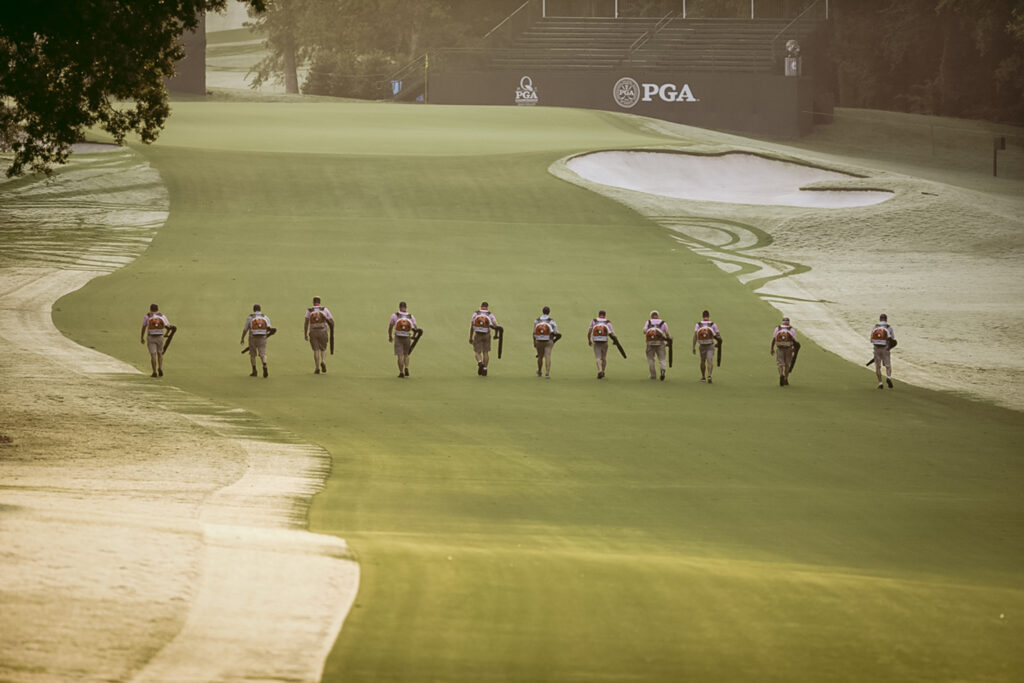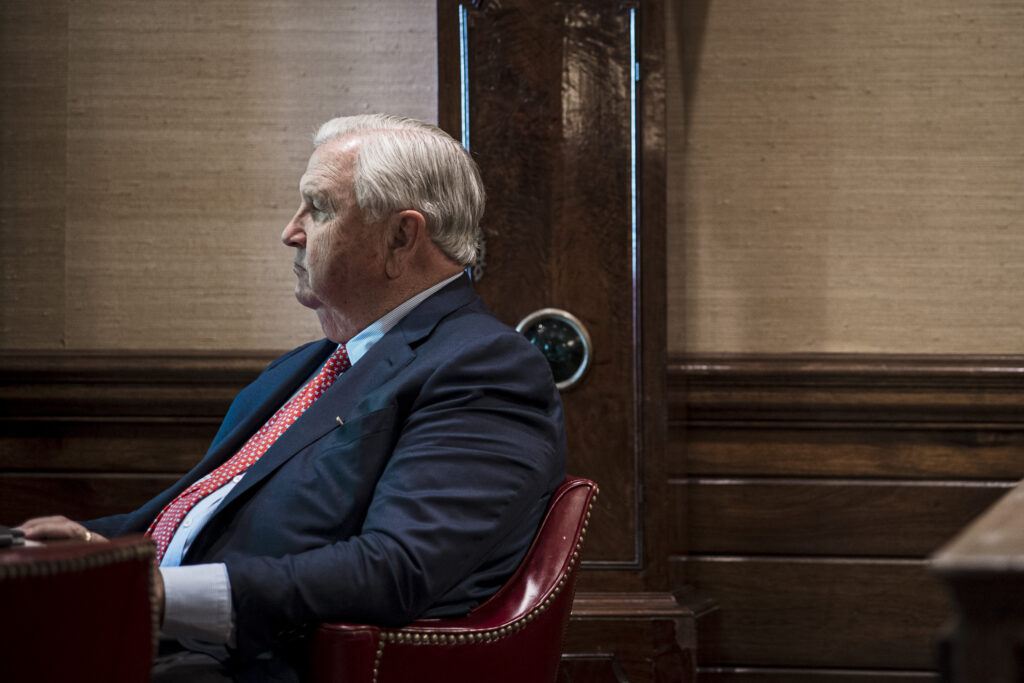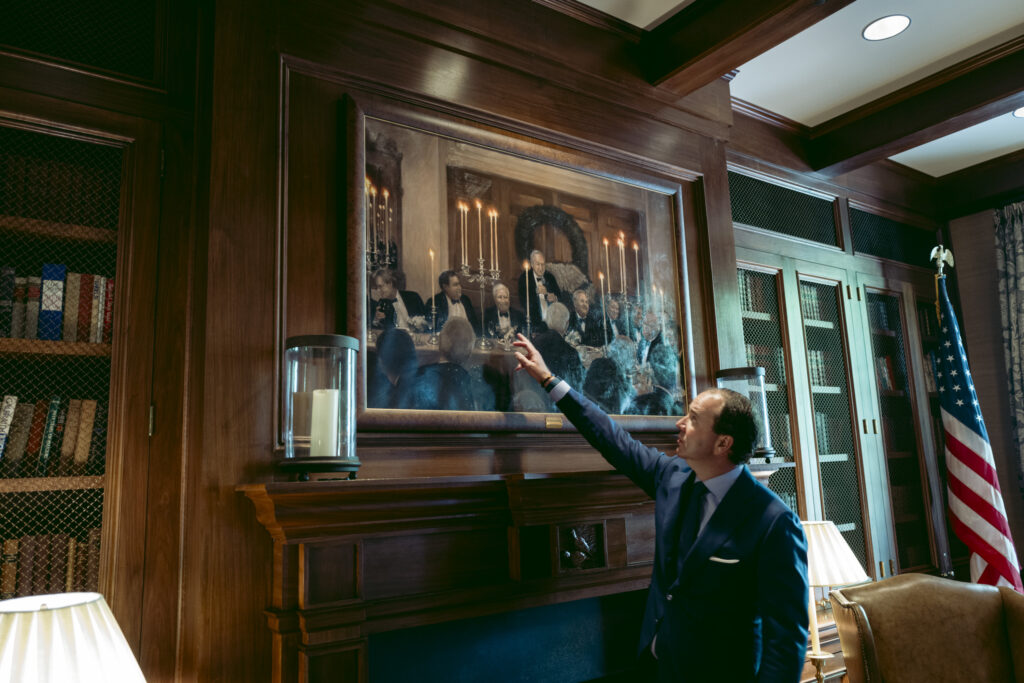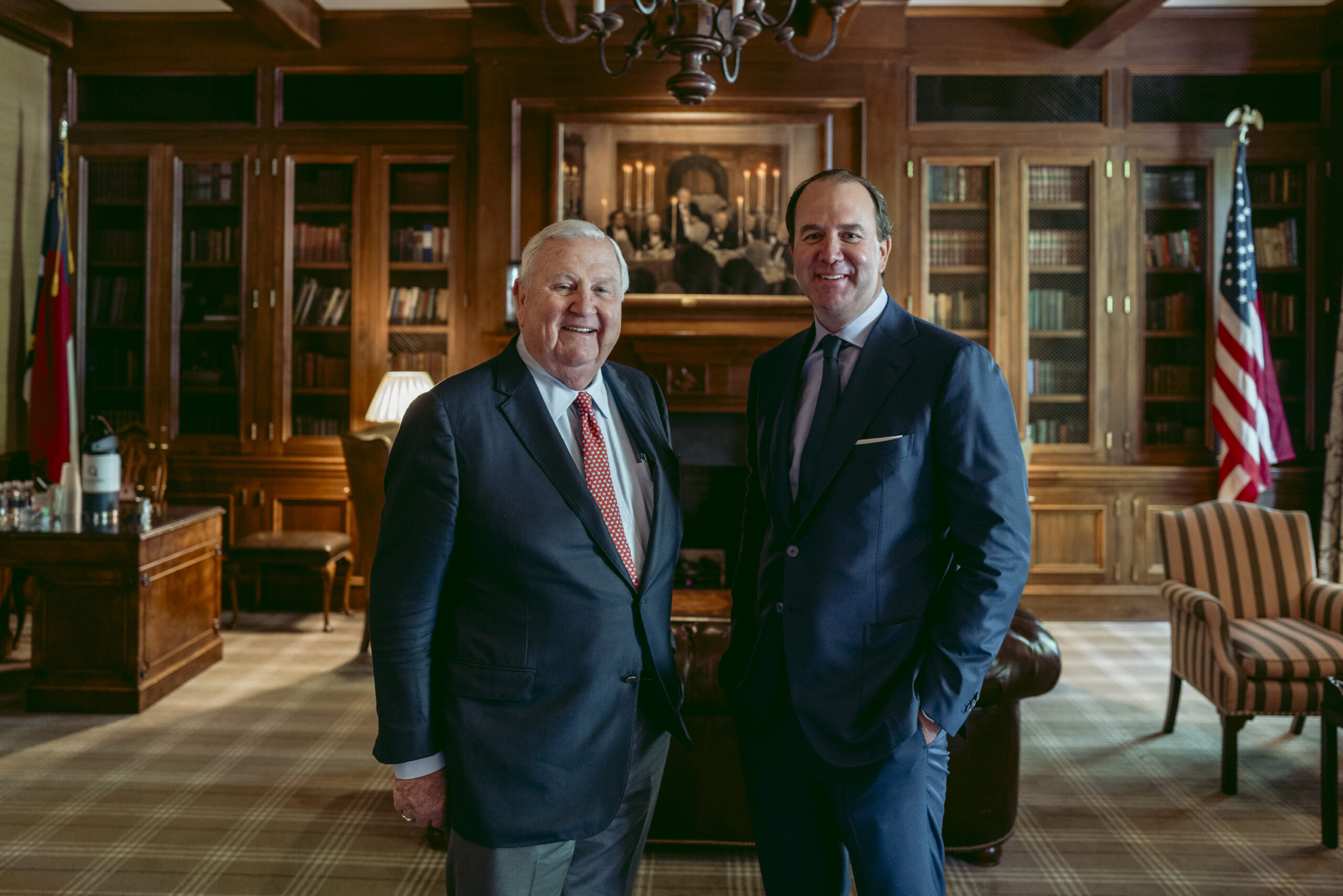It’s true what they say about Johnny Harris, at least the part about how you can hear him coming long before he arrives.
He’s still a freight train, although maybe a little more polished and patient now in his late 70s than he was in his 30s. On Good Friday morning last month, five days after he was in Augusta to witness an electric Masters finish, and three weeks before the PGA Championship at his home Quail Hollow Club, his voice rumbled down the hallway like a Harley. And when he walked into the library to greet me, I thought the lights might flicker.
He asked me where I wanted him and his son, Johno, to sit. I asked where might be most comfortable for him.
“I don’t care,” he chuckled in a classic drawl that smashes I don’t into Ion. “I’ll sit wherever you tell me to.”
I suggested the couch.
“Well, two of us on the couch doesn’t look very good,” he said. He pointed to the card table on the other side of the room, and so that’s where “wherever you tell me to” would be.
It was a quick frame for what’s made Harris a dominant figure in Charlotte history, and in the golf world, and just about any room he enters: He welcomes ideas, but he’ll let you know if he has a better one. Also, details matter.
There was a lot going on around him, with 18-wheelers rolling in and out of the parking lots with grandstand materials and tents and whatever else it takes to create a temporary golf city.
And there was a lot going on in his mind, as he contemplated the tournament he helped build and the city he helped build and whether he’s lived up to the charge his father gave him long ago: “Leave it better than you found it.”
He once convinced the Charlotte Chamber team to dress up in football jerseys and shoulder pads for a team photo, and, to this day, he still talks like he’s giving a halftime speech for the city he loves.
“There’s something else coming (to Charlotte), and I don’t know what it is yet,” he said at one point. I kept quiet and waited for him to spill something. “No, I really don’t know what it is,” he laughed. He just, well, believes it.


In the immediate future, what’s coming to Charlotte are 200,000 people and the 150 or so of the best golfers in the world.
His son, Johno, is the tournament chairman, which means he’s trying to make sure all those people get here, have a good time, and get home safely.
Johno’s a 46-year-old development executive with two teenagers of his own and a million things to do. As soon as he walked into the library, a staffer popped into the doorframe with a question. Johno answered it and stroked his tie, as if it were a calming mechanism to tell himself all was straight.
“Duck in the water,” Johno told me of what it’s like to prepare for this event. Calm on the surface but, “paddling like hell underneath, right?”
The main storyline on the golf course will be Rory McIlroy, a Northern Irishman who’s become a Charlotte hometown favorite. He’s won four times at Quail Hollow, starting with his first PGA Tour victory in 2010, and most recently last year’s Wells Fargo. He’s also now a Quail Hollow Club member.
McIlroy returns to Charlotte after winning his first Masters title last month in a sudden-death playoff. Johnny’s a longtime Augusta National member and was there for the final putt. Johno was traveling for work but watched on TV. When McIlroy crumpled to the green and wept after sealing it, Johno said, “I think everybody in our family was crying.”
Johnny, ever the pitchman, had an accompanying thought: This’ll be really good for Charlotte. By the next morning they were already seeing a surge in ticket sales.
That’s all to say: If Rory takes the PGA crown this week, Charlotte might just throw him a parade down Park Road.
The Harrises are not trying to “best” the Masters. They’re trying to “build upon” it. This is how they say they think of all their work — whether it’s developing a neighborhood or launching a major championship.
“Add it to the woodpile,” Johno likes to say, using a slogan coined by family friend Erskine Bowles, the former White House Chief of Staff and UNC System President.
And to understand what this week means to them and to the city, they say, you have to understand the whole woodpile.
“You have to think about the evolution of Quail Hollow,” Johnny Harris began, “and how it runs parallel to the evolution of Charlotte and the Carolinas.”


It goes back to a story Johnny’s told countless times, of the 25 men who gathered in 1959 to ask golf legend Arnold Palmer if they could build a course here that would lure a major golf tournament to the city.
Palmer’s response: “Put up enough money and they’ll play down Independence Boulevard.”
Charlotte was hardly a major-championship-caliber town then. It had about 270,000 residents, only slightly larger than Greensboro-High Point. Park Road Shopping Center had opened just three years earlier. SouthPark was a dairy farm, and what’s now Ballantyne had more horses than homes. Schools had only begun to desegregate. Charlotte native Charlie Sifford, maybe the most important golfer in the history of this city with a rich golf tradition, didn’t break the PGA Tour’s color barrier until the next year, 1960. Johnny was a young teenager.
A long time ago, but hardly ancient times.
For many of us, if we’re lucky, we’ll be able to own a rectangle of this city, have a house on it, and in time add a room or a patio we can show off to friends who’ll say a polite “wow” while quietly judging the paint color. The American dream.
Johnny Harris added cities onto a city throughout his development career, with Bissell Companies and later with Lincoln Harris.
Ballantyne. Morrocroft. Piedmont Town Center. Phillips Place. Those were some of the patios he added to Charlotte’s south side, turning old family land into sources of lasting tax revenue for the city. He also strung the lights of sports, leading efforts in the 1980s and 1990s to land the Final Four and launch the Hornets and Panthers. He also served on the board of U.S. Airways when it expanded its hub at the airport.
His wife, Deborah, made constructing Charlotte a family investment. She was the leader of the Arts & Science Council who spent a decade championing the creation of the Blumenthal Performing Arts Center, now the centerpiece of the uptown arts scene.
It’s hard to argue their results: The Harrises helped take Charlotte from an “overgrown truck stop” that ranked in the 30s among the largest U.S. metros in the 1980s, to a top 15 city today.
In 2003, Wachovia signed up to help relaunch a professional tournament at Quail Hollow, six years after a major course renovation. And on and on the Harrises went, hyping and building, until Quail Hollow achieved its mission, in 2017, hosting the PGA Championship. Five years later it hosted the Presidents Cup.
I went back through newspaper archives and one scene was priceless. At the groundbreaking for the old Charlotte Coliseum in August 1985, a band played the song “Pennies From Heaven” while Johnny Harris and other civic boosters, including Mayor Harvey Gantt, gathered under a shed at the Charlotte Regional Farmers Market. “You’ll find your fortune falling all over the town,” the lyrics go. “Be sure that your umbrella is turned upside down.”
It was so hot, according to an old Charlotte Observer story from that day, that Harris walked around with ice in his beer.
“We’re building it for the next 30 years, not the last 30 years,” he’d say.
When I brought up that quote for him last month, he just said, “That’s exactly right,” as if it was not a temporary aspiration but a rule of life.


When Johno Harris was about 11 or 12, the family took a trip to a senior PGA tournament in Florida where Arnold Palmer, by now a close family friend, was playing. After Palmer finished his round for the day, he greeted his wife and the Harris family and told everyone to go ahead to eat. Everyone except Johno, that is.
Palmer took Johno to the practice range. Johno can still hear Palmer’s hands grab hold of the leather grip and twist, twist, twist.
“Are you playing golf?” Palmer asked Johno.
“I am,” Johno said.
“Do you like it?”
“I love it.”
Then Palmer looked at him: “If you decide you’re going to play this game, you have an obligation and a responsibility to give back to this game.”
Johno’s tried to apply that principle to most areas of his life. He’s now about the same age his dad was during those 1990s years when the Final Four and Panthers arrived. He’s the senior executive vice president at Lincoln Property Company, which dropped the Lincoln Harris name two years ago as part of a transition phase that saw Johnny step back from the day-to-day.
His development work is more national and global than his father’s was. He travels all the time, he says, as Lincoln takes on projects like the new stadium and entertainment district in Cleveland, or a new team headquarters for the Cowboys in Dallas. He also helmed the development of the Legacy Union building in uptown. And now, one of his top jobs as tournament chairman is to maintain the corporate relationships.
This year’s championship has already broken the record for hospitality sales and premium seating, and Johno estimates they’ll shatter it by about 20%.
I’m only about a year younger than Johno, and was feeling like a slouch next to him by the end of our conversation, so I had to ask:
“What’s the worst you ever got in trouble?”
He peeked over at his dad.
“On top of Eastover school,” Johnny said.
“Yeah, that’s exactly the one,” Johno confirmed.
“On the roof.” Johnny’s belly was hopping while he laughed.
“What were you doing up there?” I asked.
“It was not a smart thing,” Johno said, “that we’d decided was a smart thing to do. It wasn’t.”
There is grief in the Harris story, too, though. In 2018, Johno’s older sister Sara “Sunny” Harris Hutchinson died at 43 years old. Her loss cut a hole in Charlotte’s civic community, and it’s still felt all around Quail Hollow. The PGA of the Carolinas named a fellowship, awarded to entry-level golf industry professionals from a diverse background, the Sunny Harris Hutchinson PGA WORKS fellowship.
Johno and Johnny said they weren’t in a place to talk about that when we met.
“I will tell you this,” Johnny said. “This tournament is a family tournament. And she was an integral part.”
Said Johno: “It’s not lost on any of us.”


The tents are up now along Gleneagles Road. Parking lots are marked. Airbnbs, rented. Tickets, distributed. CATS is offering free transportation for ticket-holders on its buses and light rail — a method of transportation that would’ve been unimaginable when Quail Hollow was founded in 1959.
Practice rounds start tomorrow, after two years, or maybe 66 years, of preparations.
Charlotte’s been good to the PGA Championship from a financial standpoint, and much of that is due to the Harris family’s ability to generate support around it — and around them — over decades. They believe Charlotte will get a return on that, in the form of business deals and ideas that might be bred over lunch or cocktails in the hospitality tents this week.
Back inside the library, across the room from the card table, there’s a painting. It’s of a scene from the club’s 50th anniversary in 2010, with Johnny Harris at a table surrounded by club members while Arnold Palmer raises a glass to toast.
The thousands of spectators coming to Quail Hollow this week will not have access to that painting or the library it’s in. And most people in Charlotte will never sit around a table at Quail Hollow. But the Harrises believe, as ever, that the more things Charlotte builds, and the more events Charlotte hosts, the more investments will come to the city, the more chances more people will have to better their lives here.
Johnny closed our conversation by reciting the last words Palmer ever spoke to him, about a decade ago, as he left Quail Hollow to get on a plane to go home: “Greatness is always under construction.”
Then he walked out of the library. A second later, though, he burst back into the room. “Excuse me for not shaking hands,” he said. “I know better than that.”
This time it didn’t feel like the lights would flicker.
Johno stayed for a few more minutes and pointed out each person in the painting.
I asked him if he’s thought about what the 100th anniversary will look like in 2060. He’d be in his early 80s then.
He didn’t hesitate.
“Sure, I’ve thought about it.”
Editor’s note: I corrected this story to show that Charlotte is a top 15 city for population, not that the Charlotte Metro region overall is in the top 15.
